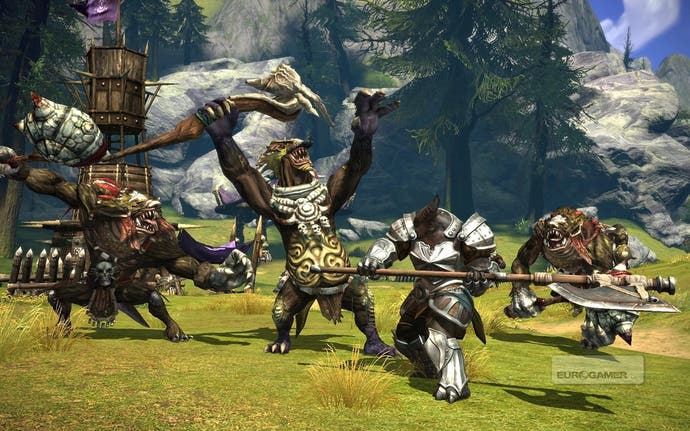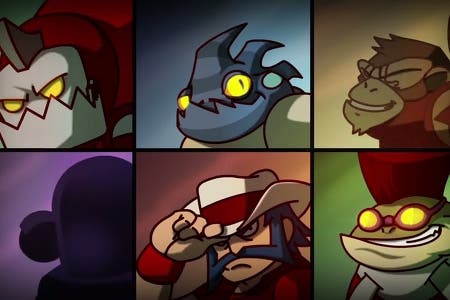Game of the Week: Awesomenauts
Heroes and zeros.
It's just like old times. There's a new massively multiplayer online role-playing game out this week! In a box and everything!
This was a much more common occurrence back when I joined Eurogamer in 2008 to work on coverage of MMOs. World of Warcraft's singular success was about to turn into a boom business and everyone was invited, we very wrongly assumed. What actually happened was a string of over-hyped launches falling flat before a couple of years of nothing happening - save those same games humbly announcing that they were going free-to-play.
In 2012, though, the MMO is officially back. WOW has begun its (presumably very stately) decline, Star Wars: The Old Republic busted blocks with its mammoth launch in December, and this week we have slick-looking Korean-made hopeful Tera; look out for more in our launch weekend report next week, and a full review a bit further down the line. After that it's The Secret World, Firefall, Planetside 2, Guild Wars 2 and fascinating Eve Online side-project Dust 514; next year, the long-rumoured The Elder Scrolls Online. Further off lie prospects like Carbine's WildStar and Blizzard's mysterious project Titan. It's actually an exciting field again.

Well... kind of. The problem with MMOs is that these gargantuan projects take fistfuls of years and tens (in some cases, hundreds) of millions to make, and their developers consequently move with the agility of oil tankers. It's telling that a couple of the games I just mentioned were on the list of prospects I made when I started my job four years ago, and the exciting design and technology innovations in the field that have seen the light of day in those four years can be counted on the fingers of no hands. MMOs are in the grip of a deep conservatism, one that's evident in the well thought out but seen-it-all-before design of TESCO (as I am going to insist on calling it) which has just leaked.
Not that all other forms of gaming are fountains of innovation of course. This week we also get two shining examples of "if it ain't broke, don't fix it, but you might want to turn up the dubstep or add a slow-mo murder cam". Sniper Elite V2 by Oxford's Rebellion and MUD: FIM Motocross World Championship by Milan's Milestone aren't ambitious, but they are entertaining efforts from studios who know their limits.
"This is not a sophisticated game in ethos or execution: it's a series of environments in which you shoot men's balls off in slow motion," wrote Marsh Davies in our Sniper Elite V2 review. "But this singular calling is, on the whole, well served, and Sniper Elite V2's perfunctory ancillary mechanics don't distract from the practice of cinematic Nazi gelding."
It's a similar story with MUD; our review will be published next week, but I can reveal that bike-hound Matt Edwards reckons that "MUD is a competently constructed racing game that offers an accessible riding model with a few wobbly tricks. It lacks the ambition and style of some of its four-wheeled contemporaries, and you could argue that this license would have been better served by a semi-simulation like Milestone's own SBK. But by focusing on what makes motocross fun to watch rather than ride, it replicates the excitement of jumping from lip to lip astride a two-stroke tearaway... just about."
The thing is, these games are grist to the mill of hard-working journeyman outfits like Rebellion and Milestone, and like the similarly blandly enjoyable (if admittedly much cheaper) Fable Heroes, they're competing for impusle-buy cash, not a standing order from your bank account. The scale of MMOs is what makes their makers so timid, but it's arguably what should compel them to try harder and be bolder.
Especially with the new kind of competition they're facing: smaller, more focused and much cheaper games that can dance around these lumbering giants. World of Warcraft surrendered its biggest-online-game-in-the-world crown not to a me-too MMORPG, but to League of Legends - and it's this mod-born style of arena combat game that inspires our game of the week.
Awesomenauts
While others scratch their heads about how to put MMOs on consoles, Ronimo Games has instead set its sights on what the kids are playing right now. The result is a slimline but focused multiplayer game that cannily keeps the basic mechanics - a combination of levelling, teamwork, domination and tower defence - but swaps out the idiom for something that suits its host platform to the ground.
So it's out with the top-down view click-to-move set-up that the PC titles owe to their real-time strategy roots, and in with the 2D cartoon presentation and vintage platform-game controls of every other game on Xbox Live Arcade and PlayStation Network. A simple, brilliant transposition.
"Awesomenauts is a tough game to walk away from, with a just-one-more-go dynamic that tugs you back in, time and again," wrote Simon Parkin in our Awesomenauts review. "Ronimo's typically squeaky-clean presentation makes this a pleasant game to splash about in, but don't mistake the bright, saturated colours for a lack of strategic maturity. This is a deep, engaging, beautiful game, a welcome alternative to DOTA and League of Legends for the console crowd."
Perhaps it's unfair to compare a genre popularised by a highly competitive pro-gaming scene with one whose appeal rests on deep immersion in online worlds. On the other hand, League of Legends seems to be able to keep just as many people obsessed for just as much time as WOW did at its height. Awesomenauts may not be the next mega-hit - it almost certainly won't be - but it's a sign that this grass-roots game style has already started to mutate, to diversify, to evolve. Adapt or die; it's Darwinian theory in action, and MMOs are starting to look like the dinosaurs.






